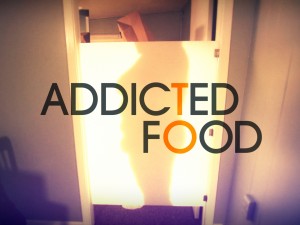
The OWN network produces a docu-series, Addicted to Food
Although food addiction is not listed in the Diagnostic and Statistical Manual of Mental Disorders, the term is widely understood as an obsessive-compulsive relationship to food. However, drawing the line between obsessive eating and the Standard American Diet (S.A.D.) can be difficult, as overindulgent eating is not only acceptable in today’s society but also, in many cases, encouraged. This discrepancy has fueled an intriguing debate, challenging researchers to answer the question: Is it really possible to be addicted to food?
As the Yale Rudd Center for Food Policy & Obesity notes,
Behavioral markers of addiction, such as continued use despite negative consequences and unsuccessful attempts to cut down, are evident in problematic eating patterns.
So is addiction to blame for our inability to step away from that second bowl of ice cream? Evidence suggests that, for some, the answer may be yes.
Documented in articles like Heroin vs. Häagan Dazs and If Food Addiction Exisits, Blame the Brain – Not the Cookies, the Yale Rudd Center published a 2011 study, Neural Correlates of Food Addiction (Archives of General Psychiatry); the study found that when women who exhibited three or more symptoms of food addiction (as defined by the Yale Food Addiction Scale) viewed images of ice cream, they showed more activity in brain regions associated with drug addiction (the amygdala, anterior cingulate cortex and medial orbitofrontal cortex) than women who didn’t exhibit any symptoms of food addiction. The study concluded:
Similar patterns of neural activation are implicated in addictive-like eating behavior and substance dependence: elevated activation in reward circuitry in response to food cues and reduced activation of inhibitory regions in response to food intake.
In April 2012, Dr. Nora Volkow, director of the National Institute on Drug Abuse, challenged her audience at Rockefeller University to:
Compare the proportion of obese people in America to those who are addicted to drugs and then try to argue that food isn’t as addictive as crack cocaine (Time).
Elaborating on the importance of the neurotransmitter dopamine, Volkow explained that reductions in the number of dopamine D2 receptors are common in patients with drug addictions and obesity. Research also suggests that leptin (a chemical that helps tell the brain we’re full) may play a role in substance abuse, by modifying the rewarding effects of alcohol and cocaine – another similarity between food and drug addictions (as a decrease in leptin sensitivity can lead to overeating).
However, the concept of food addiction is still controversial. As Volkow notes,
It has polarized the [addictions] field.
Illustrating the point, Keri Gans, registered dietician and past-president of the New York State Dietetic Association, argues that food addiction doesn’t exist:
I claim that – no – you cannot be addicted to food, but you can have behavioral and emotional reasons that cause you to overeat. Our body needs food for survival, which is definitely not the case for drugs and alcohol. I think claiming you are addicted in some instances is taking the easy way out, basically saying that it is beyond your control.
So what do you think? Is it really possible to be addicted to food?
(For more details on the Yale study, click here. If you think you may be a food addict, click here to take an abbreviated version of the Yale Food Addiction Scale, presented by CBS, or here to visit Food Addicts in Recovery Anonymous.)
References:
Cevallos, M. “If Food Addiction is Real, Blame the Brain – Not the Cookies.” Los Angeles TImes, 5 April 2011.
Gans, K. “Food Addiction: Fact or Fiction?” The Dr. Oz Show Online, 14 January 2012.
Gearhardt AN, Yokum S, Orr PT, Stice E, Corbin WR, Brownell KD. Neural Correlates of Food Addiction. Arch Gen Psychiatry. 2011;68(8):808-816. doi:10.1001/archgenpsychiatry.2011.3
Szalavitz, M. “Can Food Really Be Addictive? Yes, Says National Drug Expert.” Time, 5 April 2012.
Szalavitz, M. “Heroin vs. Häagen-Dazs: What Food Addiction Looks Like in the Brain.” Time, 4 April 2011.



This is a great post! I can see why it would be hard for someone who has never really struggled with weight to say that it wasn’t an addiction, but from someone who has I would say that it is and can be an addiction. Did that sentence make sense??? :)
I have spent most of my life struggling with my weight and fighting off binge moments and finally realized that this is something that will always be on my mind. I have hard days where I want to just burry my head in chocolate, but I also have others days where I feel great and make the best decisions to fuel my body correctly. I had to come to the realization that I eat to live not live to eat. I didn’t turn to any form of substance to numb myself. I turned to food. I do believe that there was something emotional that led me to do that. Fear of rejection, not having a lot growing up, being the “chunky” friend… It sort of had this snowball affect. Thank you for posting this!! :)
I think that saying you used is perfect: eat to live, don’t live to eat! Food produces so many physical changes in our bodies (sometimes making us drowsy, when our sugar levels are off; sometimes making us happy, when we associate a certain taste with a pleasant memory; sometimes making us relaxed, when the food releases serotonin or dopamine – like chocolate!). I think it’s unfair to say our minds/bodies can get addicted to these types of physical changes when they’re produced by “drugs” but not when they’re produced by food! So glad you enjoyed the post – and wishing you all the best with your food struggles! ♥